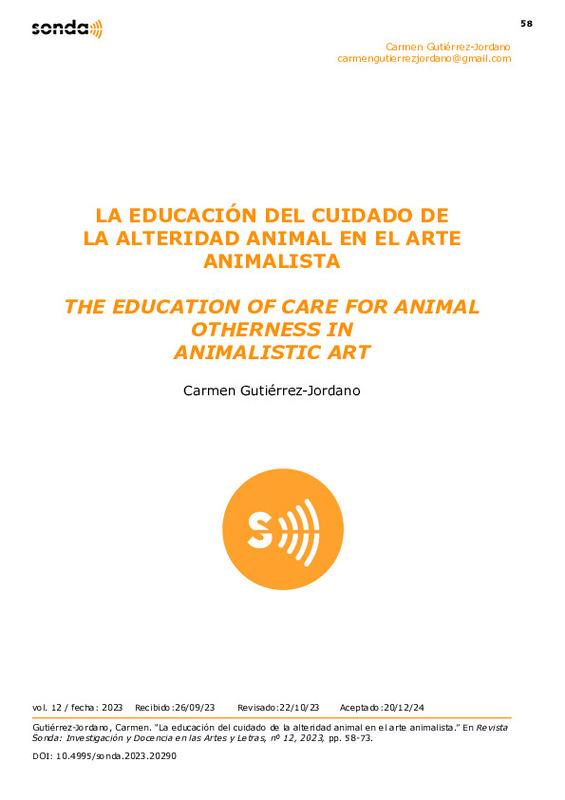- RiuNet repositorio UPV
- :
- Investigación
- :
- Material investigación. Editorial UPV
- :
- Revistas UPV. Editorial UPV
- :
- Revista Sonda: Investigación en Artes y Letras
- :
- Revista Sonda: Investigación y Docencia en Artes y Letras - Vol. 12 (2023): La producción artística; un reto colectivo en proceso de cambio y corrección permanente
- :
- Ver ítem
JavaScript is disabled for your browser. Some features of this site may not work without it.
Buscar en RiuNet
Listar
Mi cuenta
Estadísticas
Ayuda RiuNet
Admin. UPV
La educación del cuidado de la alteridad animal en el arte animalista
Mostrar el registro sencillo del ítem
Ficheros en el ítem
| dc.contributor.author | Gutiérrez-Jordano, Carmen
|
es_ES |
| dc.date.accessioned | 2024-02-07T10:06:06Z | |
| dc.date.available | 2024-02-07T10:06:06Z | |
| dc.date.issued | 2024-01-18 | |
| dc.identifier.uri | http://hdl.handle.net/10251/202378 | |
| dc.description.abstract | [EN] Care represents a new ethic that overcomes anthropocentrism and its will to dominate. This category of care is fundamental to education. Without care there is no education and care is the primary goal of all pedagogy. The concept of care for animal otherness is an essential pro-blem for today s pedagogy. The ethics of care is the foundation of the new animalist and ecocen-trist movements that are at the base of post-an-thropocentrism. The care of animals and nature is an essential objective of the current pedago-gy. Animals are an exemplary case of otherness. Artistic images have a great pedagogical power, because they educate through the experiences they produce. It thus has a greater possibility of transforming the conscience, the ultimate goal of education. Animalistic art is an ideal tool to teach the cruelty suffered by animals and the need to take care of them. It is the best school of the ethics of animal care. | es_ES |
| dc.description.abstract | [ES] El cuidado representa una nueva ética que supera el antropocentrismo y su voluntad de dominio. Esta categoría del cuidado es fundamental para la educación. Sin cuidado no hay educación y el cuidado es la meta primordial de toda pedagogía. El concepto de cuidado de la alteridad animal es un problema esencial para la pedagogía actual. La ética del cuidado es el fundamento de los nuevos movimientos animalistas y ecocentristas que están en la base del posantropocentrismo. El cuidado de los animales y de la naturaleza es un objetivo esencial de la pedagogía actual. Los animales son un caso ejemplar de alteridad. Las imágenes artísticas tienen un gran poder pedagógico, porque educan mediante las experiencias que produce. Así tiene mayor posibilidad de trasformar la conciencia, meta última de la educación. El arte animalista es una herramienta ideal para enseñar la crueldad que sufren los animales y la necesidad de cuidarlos. Es la mejor escuela de la ética del cuidado animal. | es_ES |
| dc.language | Español | es_ES |
| dc.publisher | Universitat Politècnica de València | es_ES |
| dc.relation.ispartof | Revista Sonda. Investigación en Artes y Letras | es_ES |
| dc.rights | Reconocimiento - No comercial - Compartir igual (by-nc-sa) | es_ES |
| dc.subject | Care | es_ES |
| dc.subject | Pedagogy of experience | es_ES |
| dc.subject | Otherness | es_ES |
| dc.subject | Post-anthropocentrism | es_ES |
| dc.subject | Animalistic art | es_ES |
| dc.subject | Cuidado | es_ES |
| dc.subject | Pedagogía de la experiencia | es_ES |
| dc.subject | Alteridad | es_ES |
| dc.subject | Posantropocentrismo | es_ES |
| dc.subject | Arte animalista | es_ES |
| dc.title | La educación del cuidado de la alteridad animal en el arte animalista | es_ES |
| dc.title.alternative | The education of care for animal otherness in animalistic art | es_ES |
| dc.type | Artículo | es_ES |
| dc.identifier.doi | 10.4995/sonda.2023.20290 | |
| dc.rights.accessRights | Abierto | es_ES |
| dc.description.bibliographicCitation | Gutiérrez-Jordano, C. (2024). La educación del cuidado de la alteridad animal en el arte animalista. Revista Sonda. Investigación en Artes y Letras. 12:58-73. https://doi.org/10.4995/sonda.2023.20290 | es_ES |
| dc.description.accrualMethod | OJS | es_ES |
| dc.relation.publisherversion | https://doi.org/10.4995/sonda.2023.20290 | es_ES |
| dc.description.upvformatpinicio | 58 | es_ES |
| dc.description.upvformatpfin | 73 | es_ES |
| dc.type.version | info:eu-repo/semantics/publishedVersion | es_ES |
| dc.description.volume | 12 | es_ES |
| dc.identifier.eissn | 2254-6073 | |
| dc.relation.pasarela | OJS\20290 | es_ES |








